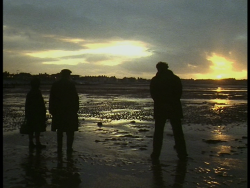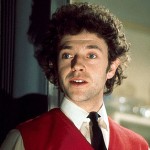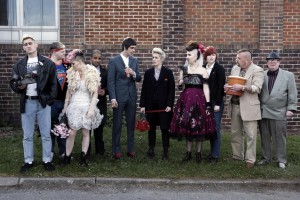by DAVID ROLINSON
Play for Today Writer: Alan Bennett; Director: Stephen Frears; Producer: Innes Lloyd
‘Knocking-off time…’

Sunset Across the Bay follows a retired couple who move from Leeds to the seaside resort of Morecambe. Their struggle to adapt to retirement produces humour through the observation of Northern dialogue and idiosyncrasies, but moves towards tragedy.1 One of many impressive collaborations between writer Alan Bennett and director Stephen Frears, the play combines understated emotional power and a sense of the social impact of urban planning with a skilful deployment of technique that builds mood, character and theme.
This essay owes a debt of gratitude to the Arts and Humanities Research Council, who provided me with vital research leave in 2008 to research the films of Stephen Frears. ↩


